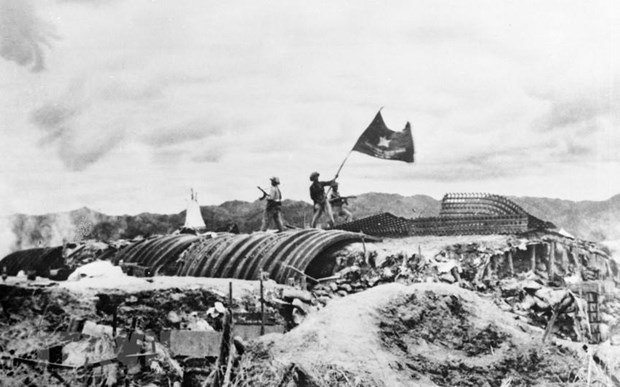 |
| The victory flag was flying on top of the bunker of French General de Castries on May 7, 1954 (Photo: VNA) |
In a recent interview granted to Vietnam News Agency correspondents, Said Bouamama further asserted that the collapse of the French military complex was not a purely military defeat for France, but it tolled the bell of death for the French colonialist regime.
The immediate impact of Vietnam’s Dien Bien Phu victory accelerated profound subsequent changes, not only on colonialized countries but also on the changes of French colonialist strategy, the scholar said, adding that besides being a military feat for Vietnam, the victory also serves as a symbol and a promise of independence for suppressed nations.
The victory came as a clear-cut distinction between the victor and the loser, he said, describing this as quite worthy and undeniable for Vietnam after its huge sacrifices during the war. The obvious loser was the then French state and the ruling social strata it was protecting.
However, the French people had never supported the war, the scholar affirmed, pointing to the fact that the anti-war movement was very effervescent with many activities all over France. This proves that the French people cannot be taken as the loser of the Dien Bien Phu battle.
All the factors that smash the colonialist spirit in fact are the victory of the French people, he said, concluding that the Dien Bien Phu victory holds a great significance: a defeat to colonialism, racial discrimination and the French state and at the same time a victory of the Vietnamese and French nations.
|
PM calls for upholding Dien Bien Phu victory spirit for development Prime Minister Nguyen Xuan Phuc has highlighted the historical significance of the Dien Bien Phu victory on May 7, 1954, and outlined four key tasks to accomplish the goals set for national construction and defence 65 years after the world-breaking event. In an article, PM Phuc wrote that the victory is one of the resplendent pinnacles and glorious feats in the history of fighting invaders, deserving to go into the history as Bach Dang, Chi Lang, Dong Da victories in Ho Chi Minh era. It was the victory of the aspiration for peace, independence, freedom; the strong will of self-reliance; the national liberation and people’s democracy movement across the world, he said, adding that this can be taken as a decisive blow to shatter imperialists and colonialists’ evil invasion ambition, forcing the French government to sign the Geneva Agreement and ending the war in Indochina, opening up a new chapter for Vietnamese revolution. It was an important event signaling the complete collapse of old colonialism all over the world. The Government leader described the victory of the Dien Bien Phuc campaign as one of patriotism, the Party’s proper and creative people’s war policy, the power of the great national unity, the loyal combatant solidarity among Vietnamese, Lao and Cambodian armies and peoples, and support from international friends. Amid the challenges in the new context, the PM called on the entire Party, people and army to continue standing united and strive to achieve goals, with four key tasks. The first is to persistently pursue the goal of national independence and socialism, effectively carrying out the Party’s comprehensive and concerted reform policy. The second is to continue improving the operation efficiency of the entire political system, upholding the power of the great national unity in the new condition, and inspiring the ambition to grow up by the Vietnamese nation. The building of a solid and modern all-people national defence posture which lays the foundation for safeguarding the nation is the third task, PM Phuc said, adding that the final task is to pay regular attention to building people’s armed forces, with revolutionary, elite and modern people’s army and public security as the core, contributing to successfully fulfilling the national defence task in the new situation. On the occasion of the 65th anniversary of Dien Bien Phu victory, the PM expressed his gratitude to President Ho Chi Minh and predecessors, as well as the army and people nationwide for their dedication and sacrifices in the struggle for national independence and reunification. |
 The Dien Bien Phu victory 65 years ago is not only one for the Vietnamese but also for the French people against colonialism, a French sociologist has affirmed.
The Dien Bien Phu victory 65 years ago is not only one for the Vietnamese but also for the French people against colonialism, a French sociologist has affirmed.